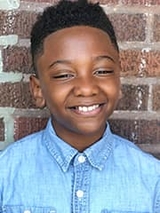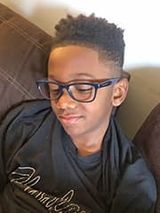ADHD and Emotional Control: Theo’s Story
ADHD and Emotional Control: Theo’s Story
Theo, a fifth grader, receives his behavioral healthcare in the same place where he receives his education: at school.

It is possible because of a unique partnership that includes Children’s Hospital of Philadelphia (CHOP), Girard College and the Independence Blue Cross Foundation, which provided $300,000 in funding to launch the collaboration, and began at the start of the 2021-22 school year. It combines in-person and telehealth services from CHOP — which provides the school with access to a dedicated psychiatrist, psychologist and licensed clinical social worker (LCSW) — with school-based support for students from the Girard College’s staff behavior specialists.
The school, an independent five-day boarding school in Philadelphia for approximately 300 students in grades 1 through 12 from families with limited financial resources, alerted students’ families over the summer that the partnership was beginning.
Sign us up!
When Theo’s mother, Najmah, learned about CHOP’s partnership with Girard College, “I reached out right away,” she says. “I don’t shy away from addressing behavioral health issues. I know when I was younger, it was lacking. I’ve been very vigilant for my kids. Kids have been through a lot over the last couple of years, and we lost another loved one recently. I saw how Theo has struggled emotionally and with certain behaviors. I saw a lot of anxiety and anger. I was concerned about him.”
She reached out to the school social worker, who — along with teachers, administrators and school counselors — had received training from CHOP on screening and referring students with undiagnosed mental and behavioral health conditions, such as anxiety, trauma, depression, substance use disorder and suicide ideation.
The social worker connected the family to CHOP psychologist Christine Waanders, PhD, who began to work with Theo. At first, because Girard College was teaching remotely, Theo’s sessions with Dr. Waanders were virtual. They worked on teaching Theo how to recognize and manage his emotions, especially grief and anger.
The diagnosis behind his behaviors
As she got to know Theo during treatment, Dr. Waanders came to think that attention deficit-hyperactivity disorder (ADHD) might be at the heart of the anger outbursts and lack of impulse control. In January, Dr. Waanders conducted a thorough evaluation that led to a diagnosis of ADHD. She looped in child and adolescent psychiatrist Eli Muhrer, MD, who joined Theo’s treatment team.
“We met with Dr. Christine and with Dr. Eli, who explained how ADHD can affect emotion control,” Najmah says. “I never felt like Theo was just ‘patient number whatever.’ Everything has been very personal, kind and nonjudgmental. I really appreciate how they talk to us. We get a warm feeling from them.”
Dr. Muhrer consulted with Theo and Najmah about whether medication would help Theo and then oversaw his medication management. When Najmah spoke with Dr. Muhrer, he emphasized Theo’s positive traits in addition to what he still needed to work on. “He told me that Theo is very self-aware and articulate, explaining how he feels and what’s going on with him. Dr. Christine has really helped him with that,” Najmah says.
Therapy yields notable progress

“With help from Dr. Christine and Dr. Eli,” Najmah says, “I and his father notice Theo exercising more self-control. That’s big: being mindful of his anger and how to feel it in a healthy way. He notices when he is struggling to focus or having a hard time sitting still and talks to his teachers about it. Dr. Eli helped him get over his bravado of ‘I got this, I can do it,’ and he’s learning it’s OK to ask for help.”
Theo’s experience is precisely what the CHOP-Girard partnership aims to accomplish: Identify and treat students whose behavioral health issues are interfering with their success.
Early intervention and treatment of mental and behavioral health problems can impact a child’s lifelong trajectory as they learn to cope with adversity, manage emotions and apply tools that help them succeed in the classroom and in personal relationships.
The partnership is countering nationwide trends
One student at a time, the partnership seeks to counter startling statistics: Nationwide, half of U.S. children with a mental health condition go without treatment, according to a Journal of the American Medical Association Pediatrics study published in 2019. Plus, youth from underserved communities — which make up the student population at Girard College — are less likely to receive mental healthcare services compared to white children, according to an Institute of Medicine Report.

Having services embedded at the school reduces the hurdle of making it to appointments that some families struggle to overcome. Most of Theo’s behavioral health session happen at the school as part of the school day. That eliminates the need for Najmah to miss work, find someone to watch his two sisters and get to CHOP.
Theo, 10, is an honor student who loves sports and plays the drums. He quickly made many friends at Girard. Once the school went back to in-person learning, Theo moved on campus, where he stays Sunday evening through Thursday. He has adapted to the boarding aspect extremely well. “Better than me!” his mother says, laughing. “He loves it, but I miss having him at home.”
The partnership between CHOP and Girard makes it easy for Dr. Waanders to check in with the school’s behavioral specialist, Lizzie Parks, Theo’s teachers and resident assistants from his dorm to see how he’s doing. Everyone in his Girard world is on the same page when it comes to helping him manage his ADHD and reach his full potential.
During the summer, CHOP will continue to provide medication management and therapy, based on each child’s needs, as the grant supports the program year-round. Therapy is option, but available based on how Theo is doing at home this summer.
“I appreciate the partnership and that the CHOP team has been an advocate for Theo,” Najmah says:
“To us, they’ve not just been great doctors, they’ve been great people, and for that our family cannot be more grateful. ”